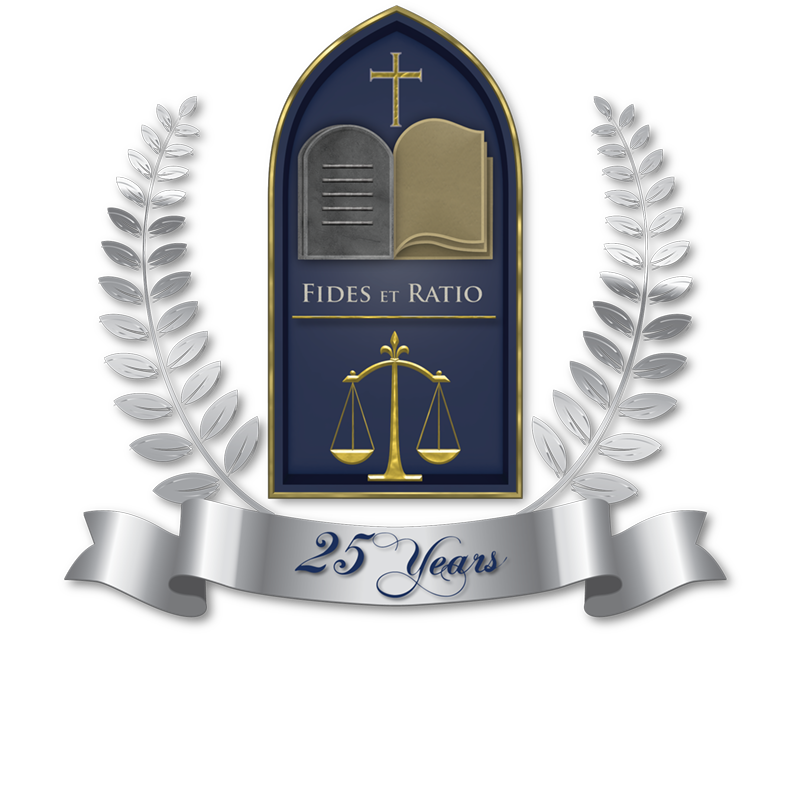(239) 687-5300
On March 3-4, 2012, a conference on “The Foundation of Human Rights: Catholic Contributions” was held at Ave Maria University in Florida. Co-sponsored by Ave Maria School of Law, Ave Maria University, and Sacred Heart Major Seminary, Detroit, the conference brought together scholars from the USA and abroad to investigate the historical and philosophical view of human rights and the importance of these rights for international and social policy. The conference was conceived and organized by Prof. Jane Adolphe of AMSL (who has represented the Holy See at several international conferences); Dr. Maria Fedoryka, a philosophy professor at AMU; and Dr. Robert Fastiggi, who teaches theology at SHMS. The conference began with an opening Mass and homily celebrated by Bishop Frank Dewane of Venice, Florida, and a special DVD message of encouragement from Cardinal Ennio Antonelli, president of the Pontifical Council for the Family.
There were four keynote addresses. Dr. Russell Hittinger, the William K. Warren Chair of Catholic Studies at the University of Tulsa, spoke on “The Legacy of Blessed John XXIII’s 1963 encyclical, Pacem in terris .” This was a most fitting topic: not only because this document is one of the seminal expressions of the Catholic view of human rights but also because Professor Hittinger will be organizing a 2012 conference on behalf of the Holy See in anticipation of the fiftieth anniversary of the encyclical.
Fr. Thomas Williams, professor at the Pontifical Atheneum, Regina Apostolorum, in Rome, spoke on “Un-Conventional Rights: Children, Parents and the States,” elaborating the Catholic understanding of the rights of parents and children with respect to the 1989 U.N. Convention on the Rights of the Child. Professor Wolfgang Waldstein of the University of Salzburg and the Pontifical Academy for Life, examined “The Capacity of the Human Mind to Know Natural Law,” a major theme of his recent book, Ins Herz geschrieben [Written into the Heart], which is being translated into English by his son, Dr. Michael Waldstein of AMU. Fr. Robert J. Araujo, S.J., the John Courtney Murray, S.J. University Professor of Loyola University, Chicago, spoke on “Our Debt to Francisco de Vitoria: A Catholic Foundation of Human Rights, ” noting the importance of this sixteenth century Dominican who has been called the “Father of International Law.”
There were eight panels at the conference, with the first six focused on the historical foundations of human rights: classical Greek and Roman (panel 1); St. Thomas Aquinas (panel two); Francisco de Vitoria, O.P. [c. 1483-1546] and Francisco Suárez, S.J. [1548-1617] (panel three); Blessed Antonio Rosmini [1797-1855] (panel four); Modern Catholic (panel five); and Recent Popes (panel six). The final two panels (seven and eight) focused on “Contemporary Human Rights Issues” from the viewpoint of international law. Among the topics treated were religious liberty in Islamic states; human rights in Africa and Southeast Asia; pro-life issues in the Inter-American System of Human Rights; teaching about religion in public schools, and gender in the United Nations system.
In addition to 16 panel speakers from the three sponsoring institutions, other U.S. colleges, universities and seminaries were represented. International speakers included Paola Bernardini, a Russell Berrie Fellow from the Angelicum University in Rome; Fr. Robert Gahl, on the Pontifical University of the Holy Cross; Prof. Riccardo Pozzo, the Director of the Rome-based, Istituto per il Lessico Intellettuale Europeo e Storia delle Idee [Institute for the European Intellectual Lexicon and History of Ideas]; and Prof. Jean-Paul Coujou, of the L’Insitut Catholique de Toulouse, the principal translator of Suárez’s metaphysical and legal writings from Latin into French. The proceedings of the conference will be published in the Ave Maria Law Review .
Contents
- Part I. Rosmini’s understanding of rights in the church, the family, and civil society / Robert L. Fastiggi
- Contemporary applications of Rosmini’s views on personhood : slavery and intellectual property abuse / Riccardo Pozzo
- The relationship of the virtue of justice to blessed Antonio Rosmini’s approach to human rights / Gerry Rauch
- Our debt to de Vitoria : a Catholic foundation of human rights / Robert John Araujo
- Francisco de Vitoria on the ius gentium and the American Indios / Victor M. Salas, Jr.
- Retrieving a Catholic tradition of subjective natural rights from the late scholastic Francisco Suárez / Steven J. Brust
- Aquinas on natural law and the question of a Kantian misreading / Patricia Pintado
- Aristotle on human rights / Michael Pakaluk
- Human rights, ancient and modern / Cecilia Castillo
- Humanitas in Cicero’s moral philosophy and its Christian reception / Thomas P. Scheck.
- Part II. “Gender” wars at the United Nations / Jane Adolphe
- Religious liberty : a common challenge for Catholic-Muslim dialogue / Paola Bernardini
- Developing the seminal theology of Pope Paul VI : toward a civilization of love in the confident hope of the gospel of life / Richard H. Bulzacchelli
- The foundation of rights in Popes John Paul II and Benedict XVI from the perspective of the gift / Damian P. Fedoryka
- Right to peace or human rights per se in Islamic states / Kevin Hugh Govern
- Foundations of human rights and development : a critique of African human rights instruments / Joseph M. Isanga
- Teaching about religion in the public schools / Stephen L. Mikochik
- The capacity of the human mind to know natural law / Wolfgang Waldstein.



